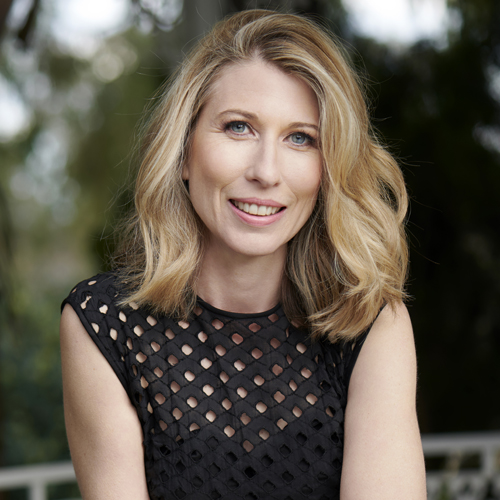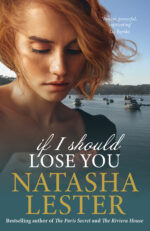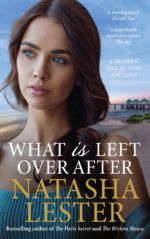Best known for her bestselling historical fiction, Natasha Lester’s contemporary novels are also cracking reads that deserve a revisit

Back when If I should lose you was first published, Natasha said, ‘My mother will assure you that I am in no way artistic – although my children very kindly tell me that I do beautiful drawings! I love art though and there is nothing better than a quiet walk through a gallery looking at pieces that stretch the imagination in the same way that a good book can.’ Since then Natasha has been honing her skills on both fronts, writing bona fide bestsellers and publishing beautiful watercolours on her website and on social media. In this interview, we take you back to the beginning of Natasha’s career and behind the scenes of her writing life.
If I Should Lose You is a book about organ donation and about ways in which we might relate to art. It is also a book about storytelling and the meaning of love. Did you begin by intending to write about each of these things, or did some of these elements evolve as you wrote your story down?
It began by being a book about organ donation, and the other themes evolved as the characters developed. I read a newspaper article about organ donation and began to think about heart transplantation in particular – we so strongly link hearts to love but what might it be like to take a heart, the symbol of love, out of one body and place it into another? And how might you view love if that was your job?
Given that such a strong focus of the book was on bodies and what the body represents, the art theme was obvious. Sculpture gave me another way to look at the symbolism of the body and its parts.
And I wanted to write a love story. When I look at my favourite books, they all have a love story as a central element. But I wanted it to be more than a romantic, idealistic love story. So I used the different kinds of love that Alix and Camille find in their lives to develop a more complex idea of what love is or might be. Camille’s relationship with her daughter is yet another kind of love and I wanted to see how maternal love and romantic love might be the same, and might be different.
Have you any medical background? If not, how difficult was it to get the medical lexicon and lifestyle to the front of your mind? And what research did you do to achieve such a seamless result?
I have no medical background. I have a marketing degree and a creative writing degree and we studied very little medicine in those degrees!
I flew to Sydney and met with doctors and nurses at St Vincent’s Hospital for my research and gave them a copy of my first book in exchange for information – I’m not sure it was a very fair exchange; I think I probably got more out of it than they did.
I was a little nervous doing the research at first because I wondered whether people who spent their time saving lives would be at all interested in talking to an author. But they were, and they were very generous with their time and the information they shared.
I was especially lucky to meet a female heart transplant surgeon – there were only six in Australia at the time of writing – and I was able to talk to her about not just the details of her job, but also how she managed her life when she worked with such intense focus for such long and demanding hours. She has two children and whenever I complain about balancing writing with the needs of my children, I think about her and what an amazing job she does.
Did you have particular or strong views on organ donation before you wrote this book? Did writing the book change these?
I generally believed organ donation to be a positive thing but I knew very little about it. Writing the book made me see how important it is to let your family know what your wishes are, so that they can be followed if anything unexpected happens. It is the nurses in the ICU who have to compassionately manage grieving families, while at the same time trying to help those who might benefit from donated organs, whose jobs we make easier if we have let people know how we feel about organ donation.
Some aspects of the novel will be confronting to the reader, particularly for mothers/parents, especially in its exploration of the moral dilemmas surrounding the lengths one might go to in order to save the life of one’s child (though I think you handle this sensitively and well!) Has motherhood altered your perspective on life, and on the things you write about now?
It has altered both my perspective on life and the things I write about. Becoming a mother has taught me more about being selfless than any other experience has. I think that the feelings a mother has for her children are some of the strongest feelings that exist, and I like to explore those feelings in my writing.
I think that when children are frightened or ill, they cling to their mothers more and this can be both a demanding and a lovely thing. I also think that, at those times, feelings of love can be pushed to their very extreme edge, and it is these intensities of emotion that I try to unravel in the book – to see how someone might behave in relation to someone they love when they are pushed to their emotional limits.
Both here and in your first novel, What is Left Over After, storytelling itself is a conscious process, and the assembling of stories is integral to your plot. What do you see as the role of storytelling in the way we make sense of the world?
Storytelling is something we encounter when we are very young, when we curl up in our mother’s lap and hear her voice and see the pictures on the pages that she turns for us. So I think it’s a really important part of who we are and how we think.
Storytelling helps us to imagine – to explore in our minds other experiences, other lives, other possibilities, and this is something that all of the characters in If I Should Lose You do at some point. The ability to imagine and to tell stories about our lives helps us to understand the things that happen to us – it also helps us to work out where our limits are. I think Camille recognises this but perhaps Alix becomes lost in the stories she creates for herself about her life and her loves. So it can be both a blessing and a burden – it can help us make sense of our lives or it can, if taken too far, take over our lives.
Are the visual arts something you have a special interest in? Can you discuss this?
I suppose I just like the way that art can approach some of the themes I look at in my writing in a different way. In What is Left Over After, photography was an important part of the story because it helped to provide a metaphorical context for the way Gaelle, the main character, viewed her life and the people in her life.
In If I Should Lose You, where the idea of what the soul might be is a key part of the book. I could have just focused on the physical body and whether a spiritual body is a part of that. But using sculpture and painting allowed me to dig a bit deeper with that idea, to show how art can be a spiritual thing, as well as help define our idea of what love is.
Lester’s contemporary novels, If I Should Lose You and What is Left Over After are both available now wherever you buy your favourite books. Join her for an in-conversation about the book on 24 July at AH Bracks Library. Tickets will be on sale soon.




